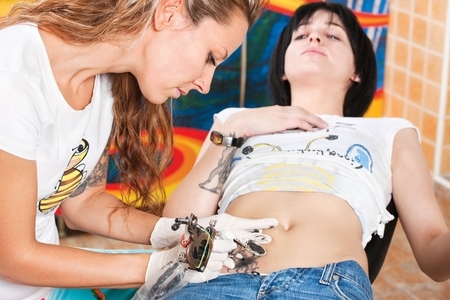 Marin Conic/PhotoSpin
Marin Conic/PhotoSpin
If you already have a tattoo or are thinking about getting one, there are a few things that you may not know about tattoos.
1. Skin Allergies
Skin allergies could develop at any time after you get inked. Some people may think that an allergic reaction would happen immediately after getting the tattoo. That’s not true. Skin allergies such as rashes or scars can occur years after you’ve gotten the tattoo.
2. The Number of Times You are Pierced
Depending on the size and variation of colors in the tattoo, your skin can be pierced between 50 and 3,000 times per minute. Some people are not aware of the amount of times the skin is pierced and this may determine the final outcome of the tattoo that was originally chosen.
3. The Tattoo Machine Itself
Did you know that the tattoo machine has four parts to it? The needle, the tube that holds the ink, an electric motor and a foot pedal to control the movement. All of these parts are necessary for the machine to produce modern-day tattoos.
4. Thinking of Getting a Temporary Tattoo?
You may want to think twice about getting that temporary ink done. The FDA recently warned that temporary tattoos made with black henna ink, containing para-phenylenediamine or PDD, can cause permanent scarring. PDD is an ingredient used in hair dyes as well.
5. Not All Tattoos Are Created Equal
Your tattoo experience will vary according to the location and tattoo artist that you choose.
If you only have a couple of tattoos or are thinking about getting your first one, it’s important to research your tattoo artist and their studio. This can reduce any discomfort you may feel during your appointment as well as help you be better prepared for any other tattoos in the future.
6. Your Tattoo Ages With You
As you get older, so does your tattoo. Your skin constantly replenishes itself and this cycle slows overtime, resulting in an aged appearance of your tattoo. For example, if you got a tattoo in your early 20s of a peace sign and it had words embedded in it, the words may blur and become more difficult to read in your 60s.
7. Be Sure That Your Tattoo is Suitable For All to See
It's true that your tattoo expresses who are or what you believe in, but is it something that you can comfortably explain to your kids or your boss? Although most of us have a good idea of where to put slightly risky tattoos, some of us need a little guidance.
It’s wise to think about how your tattoo may be perceived by others because it can lead to some social disruption between friends, colleagues and family members.
Removing a tattoo does require a good amount of money and time. Multiple sessions of laser treatments are required, and as with any procedure, it takes time out of your busy schedule and could be painful as well.
These are just a few things that you may not know about tattoos. Getting a tattoo should be an exciting experience for you. Knowing some of these facts could help you make your final decision about getting one or not.
Did we miss any interesting facts about tattoos? Share ones you know in the comments below.
Sources:
75 Radical Facts about Tattoos. facts.randomhistory.Retrieved May 15 ,2013.
http://facts.randomhistory.com/tattoo-facts.html
7 Fun Facts about Tattoos.Skincare.allwomenstalk.
http://skincare.allwomenstalk.com/fun-facts-about-tattoos/7
Tattoos Facts & Statistics.vanishingtattoo.Retrieved February 23, 2012.
http://www.vanishingtattoo.com/tattoo_facts.htm
Tattoos, What You Need to Know. Retrieved September 4, 2002.
http://www.medicinenet.com/script/main/art.asp?articlekey=21341
Reviewed November 24, 2014
by Michele Blacksberg RN
Edited by Jody Smith






Add a CommentComments
There are no comments yet. Be the first one and get the conversation started!